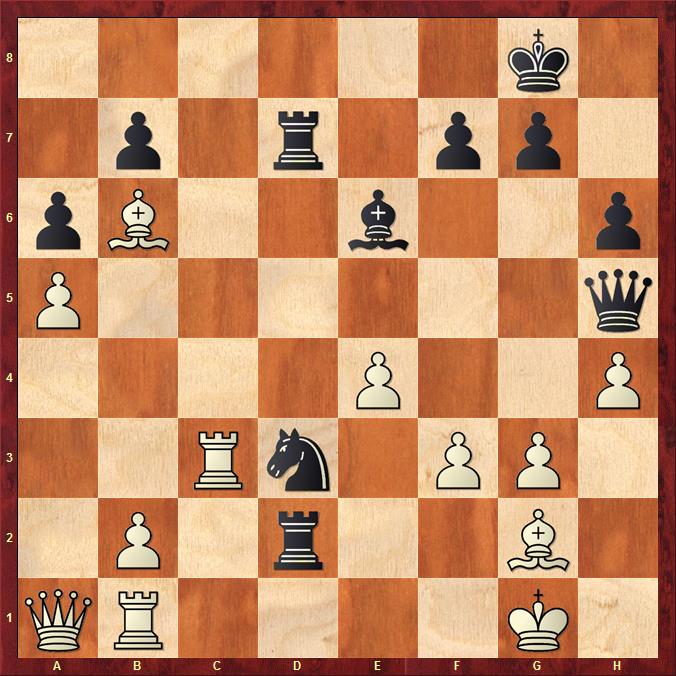Tactics Time Newsletter: The Octopus
Published: Thu, 11/06/14
| Newsletter Issue Tactics Time Newsletter The Octopus | Tactics Time | ||||||||||
| The Octopus | |||||||||||
oday's newsletter is guest written by International Master Arthur van de Oudeweetering, author of the new book, Improve Your Chess Pattern Recognition: Key Moves and Motifs in the Middlegame
Black to move. Answer below.
I think it was the late Dutch IM Leon Pliester whom I heard using the more elegant name Octopus when referring to such a terribly strong knight (of course d3 or d6 is also possible). That must have been in the days when in Amsterdam Mnashe Goldberg was still running chesscafe Gambit in his own special way. When you intend to visit Amsterdam nowadays, it boosts another chess café - De Laurierboom , while you may also want to check out Café Batavia for some occasional chess happening. Both are in the city centre.
Anyway, I decided to devote the first chapter of my book Improve Your Chess Pattern Recognition to Bogoljubov's rusty nail, but using Pliester's denomination.
In general, an octopus may well dominate, for instance, two rooks at the back rank. Logically enough tactical possibilities will flow from this strategic supremacy. In the above position, taken from a recent Bundesliga game, White's queen is also hopelessly out of place. Would Black have realized all this and thought of the powerful octopus, although most likely in time trouble here at move 39, he would certainly not have decided to reroute his proud knight back to c6 via b4 and directed his attention to the kingside. Here is the game in PGN [Event "Bundesliga 2014-15"]
[Site "Dortmund GER"]
[Date "2014.10.19"]
[Round "2.3"]
[White "Gonda, L."]
[Black "Wegener, O."]
[Result "1/2-1/2"]
[ECO "A13"]
[WhiteElo "2540"]
[BlackElo "2441"][PlyCount "92"] [EventDate "2014.10.18"] [EventType "team"] [EventRounds "15"] [EventCountry "GER"] [Source "Mark Crowther"] [SourceDate "2014.10.20"] [WhiteTeam "SG Trier"] [BlackTeam "SC Hansa Dortmund"] 1. Nf3 Nf6 2. c4 e6 3. g3 d5 4. Bg2 dxc4 5. Qa4+ Nbd7 6. Qxc4 c5 7. d3 Bd6 8. a4 O-O 9. Nc3 a6 10. a5 Bc7 11. Qa2 h6 12. O-O Qe7 13. Nd2 Ne5 14. Nc4 Rd8 15. Nxe5 Bxe5 16. Bd2 Bxc3 17. Bxc3 e5 18. Rac1 Be6 19. Qa3 Bd5 20. f3 Rac8 21. Be1 Nd7 22. Bf2 Rc6 23. e4 Be6 24. d4 exd4 25. Bxd4 Qd6 26. Be3 Ne5 27. Bxc5 Qd2 28. Be3 Qe2 29. Rce1 Qb5 30. Rf2 Nc4 31. Qa1 Qb3 32. Ba7 Rcd6 33. Rff1 Rd2 34. Bf2 Ne5 35. Re3 Qb5 36. Rc3 Nd3 37. Bb6 Rd7 38. Rb1 Qh5 39. h4 Nb4 (39... Qg6 40. g4 (40. Kh2 Rxg2+ (40... Nf4 41. Rg1 Bh3) 41. Kxg2 Nf4+) 40... Bxg4 (40... Nf4)) (39... Bh3 40. Bxh3 Qxf3) 40. Qa3 Nc6 41. Be3 Rd1+ 42. Rxd1 Rxd1+ 43. Kf2 Qxa5 44. Qxa5 Nxa5 45. Rc1 Rd3 46. Bf1 Rb3 1/2-1/2 You can play through this game here: http://www.viewchess.com/cbreader/2014/11/6/Game94633763.html
Answer:
40.g4 runs into 40...Bxg4, while after 40.Kh2 the most simple solution is 40...Nf4 (40...Rg2+ 41.Kxg2 Nf4+ also wins) 41.Rg1 Bh3.
Actually Black's position is that good you don't need to spot the more difficult 39...Bh3! 40.Bxh3 Qxf3
Happy Tactics!
Your Friend,
Arthur P.S. Be sure and check out Improve Your Chess Pattern Recognition: Key Moves and Motifs in the Middlegame
 Not a subscriber yet? Like what you read? Sign up to get future issues delivered straight to you at http://tacticstime.com!
© Copyright 2011-2014 Timothy Brennan, All Rights Reserved.
| |||||||||||
 To have a knight planted in your game at king 6 (ie e3/e6) is worse than a
To have a knight planted in your game at king 6 (ie e3/e6) is worse than a